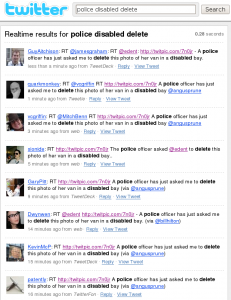Police, Camera, Action...
As I was walking home from work, I spotted an unusual sight - a police van parked in a disabled bay near my local train station. I snapped a picture of it.

Police van in a disabled bay
As soon as I had taken a shot, PC Smith (40144) came out from the train station and asked to speak with me. She asked why I'd taken a photo of her van. I told her that it was parked in a disabled bay. She told me that she'd been called because a woman was self-harming on the station and that was the only place she could park.
Fair enough, I said. Then a funny thing happened. She asked me to delete the photo.
To my mind there are only two logical reasons she could have for wanting me to delete the photo.
- She genuinely thought that the photograph was likely to be useful in the preparation of a crime.
- She had committed an offence and didn't want there to be any evidence.
I asked her why she wanted the photo to be deleted, she told me that "in the current climate" the police had been asked to stop people from taking photos of sensitive buildings and of the police.
That isn't true - and I told her so.
She asked to take down my details. I asked her why she wanted my details and whether I was obliged to give them. At this point, I asked if I could record our conversation - she agreed.
I won't post the video because, frankly, it makes both of us look like arses. I've got shakey hands and a wobbly voice, she rings her sergeant and gets told she isn't allowed to demand my details. Neither of us are left exactly covered in glory.
She was told by her superior that she could take down a description of me. I told her that asking to delete photos was silly because they can be easily undeleted. I also thanked her for not escalating the situation. I left. As I left, I allowed my phone to post the photo I'd taken to twitpic.
There are several interesting points
- Police still believe - or are still being told - that people aren't allowed to photograph "sensitive" subjects.
- Police are still asking for the destruction of private property (photographs). Know your photographic rights.
- Many people still don't understand that digital images live forever - whether on the Internet or as fragments on a memory card.
- Police still use common sense and are willing to listen if you put your case politely and firmly. That's very reassuring.
I want to make it quite clear that I have no reason to disbelieve PC Smith when she said that she was attending a genuine call. I'm not going to pursue the parking in a disabled bay matter any further. I am going to pursue the matter of the advice my local police force are given regarding the photography of them and their vehicles.
Remember, if you are taking photos that you think are genuinely important - upload them as soon as possible from your camera. If you're asked to delete a photo - it may be wise to do so; photos can be easily recovered.
Many thanks for all the retweets - it's good to know that I'm not alone in thinking that this is a farcical situation.
Edit: Thanks for all your kind words and also to Boing Boing for picking this up.

 Digital Economy Act - #DEAPPG
Digital Economy Act - #DEAPPG
steve carr says:
Jake Byrne says:
Cybergibbons says:
Jason says:
lmoore says:
Gemma Robinson says:
naomi says: